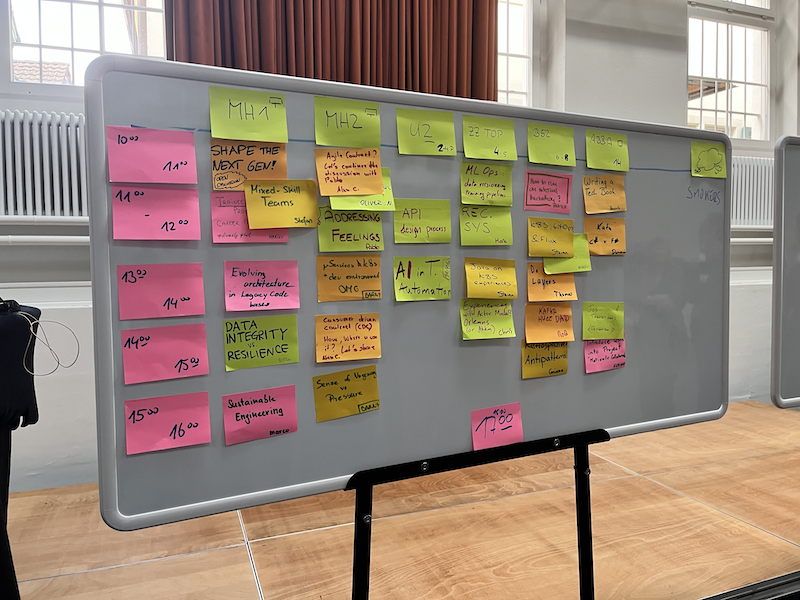SoCraTes Day 2022
Last Friday was the 2022 installment of the SoCraTes Day, an unconference about software craftsmanship and testing. I always planned on attending a SoCraTes day but didn’t find time to do it. Now the stars aligned and finally I nudged myself over to visit it for the first time.
SoCraTes Day is an unconference, this means that the talks are not defined in advance but rather all attendees can propose a talk, a discussion, or something for given time slots.
The result was this:

There were surprisingly (for me at least) a lot of soft-skill slots. I did not expect this at a SoCraTes Day but it certainly made a lot of sense, because after all, soft skills are a big part of successful coding. Another big difference to other conferences I’ve been to is that the attendees of a talk are not restricted to just listening but are encouraged to actively participate in a discussion stemming from the talk. I liked that a lot.
Some sessions I attended:
Writing a tech book
Dominik Berner talked about writing a tech book. How the process worked and how it turned out for him. I was impressed by the openness Dominik talked about his endeavor and also made my secret plans to write a book… well, obsolete :) (But basically because it’s just too much work for me ;)
Addressing feelings
This was also more of a soft-skill session. Pablo talked about how you could find out which feel you or someone else is feeling by asking a question. The feelings he presented were reduced to 4 feelings: Happyness, Anger, Sadness, and Anxiety. There was a sentence for each feeling which could be used “to detect” the feeling. For me, this was a reminder that everything, also Software development has a lot to do with feelings. It also reminded me of a book that I wanted to read but haven’t come around to yet: Atlas of the heart, by Brené Brown, in which she explains not less than 86 different feelings.
Evolving architecture in legacy code bases
This was my talk :) I wanted to talk about how to deal with code bases which have been written maybe a decade ago and how to deal with them as a software developer. I feel there is an urge of a lot of software developers to rewrite every code base from the scratch. But this is not always the best solution since there is a lot of legacy software that just works for a business. Rewriting this might bring you to the place where you have to introduce the bugs of the legacy code to your new application. Later that day I learned that the pattern we’re using at work to not rewrite a code base has a name and Martin Fowler had already written about it in 2004 :). For those who care: it’s called “The strangler fig pattern” :) Oh, and here are the slides I used in case you’re interested.
I liked the discussion which evolved after the talk more than my talk itself. The questions arose about how to push something like developer experience (DX) as a value, a business should be interested in. A topic I’m dealing with at work and was interested in getting other views on it.